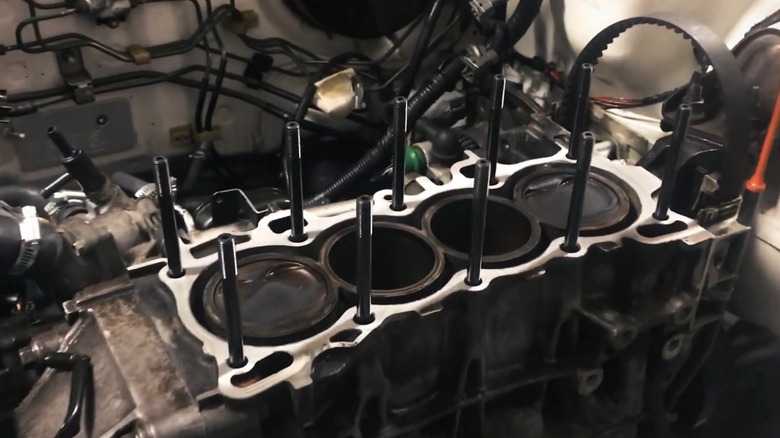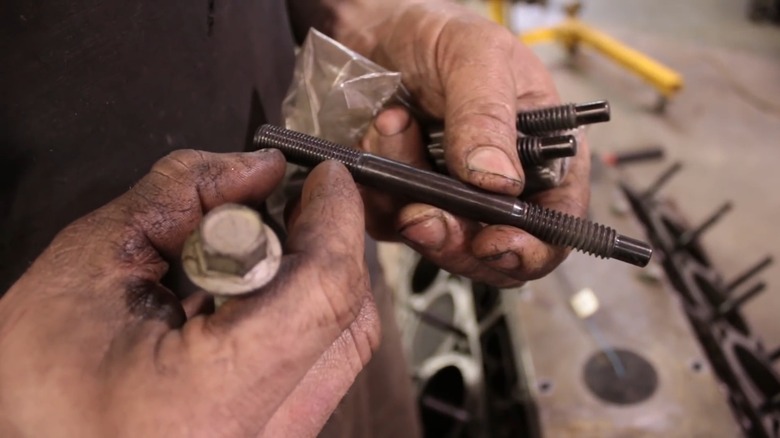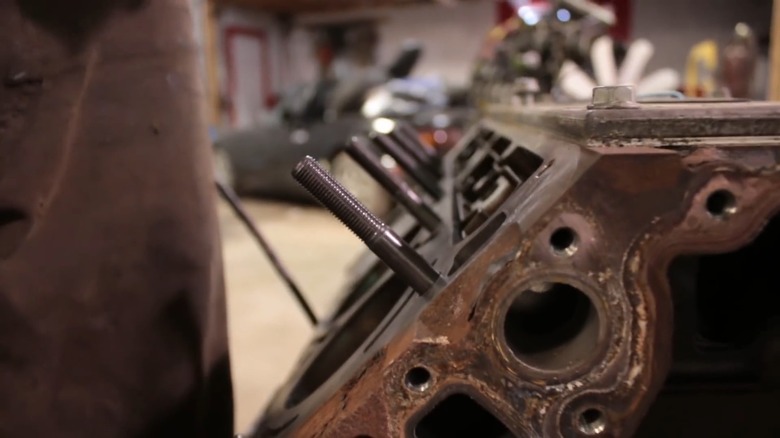What Are Head Studs On A Diesel Engine And Do You Really Need Them?
Modern internal combustion engines are under a lot of stress during normal operation. In particular, there's a lot of tension between the cylinder head and the engine block, especially in diesel motors. The head gasket lives between these two components and helps maintain a tight seal. However, over time and following routine maintenance or modifications, the bolts holding your cylinder head to your engine block can wear out and fail. When that occurs, you're likely to experience various unpleasant symptoms, including some pretty serious engine damage.
Head studs are designed to replace the stock head bolts and create a tighter, more secure seal between the cylinder head and engine block. In comparison to the stock head bolts — which look like standard bolts with long, threaded ends and hex heads — head studs are long rods with threads on both ends. That's an important difference. While head studs are insanely durable and designed to withstand up to around 160,000 psi, they're also limited by their construction. Because of the bolt head, you must twist head studs to install them.
That can result in things like inaccurate torque readings, as well as over or under-tightening and cracked components. Head studs, on the other hand, allow us to hold the engine together with more force. Head studs are stronger than head bolts and can withstand up to around 240,000 psi. By screwing a head stud into the block and then installing a finely-threaded nut on top, we're able to apply clamping force to the block and cylinder head, creating a substantially stronger bond capable of tolerating increased power levels. If you want to learn more about head studs, you're in luck. As a former professional auto repair technician, I'll break it down for you. Let's dive in.
Why do people install head studs on a diesel engine?
We mentioned that under stock conditions, your diesel engine's cylinder head and block are held together by head bolts. Normally, that's okay. Those bolts are designed to stand up to extreme amounts of pressure, and if you never separate the cylinder head from the engine block, you may never have to deal with the head bolts at all. However, if you have to remove the head bolts for maintenance, repairs, or to make performance upgrades, you'll most likely have to replace your head bolts with a new set of stock parts or some higher-quality head studs. That's due primarily to the fact that most head bolts are torque-to-yield, single-use parts, meaning that once you install them, you can't remove them and install them again without the risk of developing engine damage. For example, you may have to replace your head bolts with either a new stock set or studs after replacing a blown engine head gasket.
You may also choose to replace your head bolts with head studs if you modify your engine in an attempt to create more power. The stock bolts are engineered with specific power outputs in mind. Modifying your engine so that it creates more horsepower and torque can be fun, but it can also place a lot of extra stress on components like the head bolts. To combat that additional stress, many diesel owners and tuners opt for a high-quality set of head studs. Head studs are capable of withstanding significantly greater amounts of force and pressure, and they can usually be removed and reinstalled multiple times before you have to replace them.
Do you really need head studs on a diesel engine?
So, do you really need to install head studs on your diesel engine? Well, the answer depends on a couple of factors. First of all, if you never separate the cylinder head from the engine block, you probably won't ever have to mess with your head bolts. Remember that most people choose to replace their head bolts with head studs because the bolts have become compromised either due to damage, the addition of a power-boosting modification, or maintenance. Most stock head bolts are single-use items, meaning that if you remove them for any of the above reasons, you'll need to replace them with a new set of stock bolts or head studs.
Next, we've touched slightly on the fact that you'll need to replace your head bolts if you separate the block and cylinder head for repairs, maintenance, or modifications. However, we haven't mentioned that you may have to replace your head bolts with studs even if you don't take the engine apart. Installing performance-boosting modifications doesn't always require you to break down the engine. Adding upgrades like performance tuners, cold air intakes, or aftermarket exhaust systems doesn't require you to make extensive modifications to your engine's internals. They can, however, result in performance boosts that add extra stress to things like the head bolts. If you choose to modify your diesel truck in order to increase its horsepower or torque outputs, you should consider replacing your stock head bolts with a set of aftermarket head studs to protect your engine and ensure its smooth performance for the long-haul.


